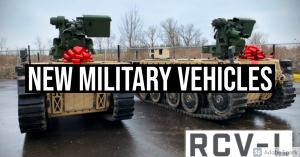I have noted that robotics is going to be in a coming global conflict what the machine gun was for World War I and the atom bomb for World War II. He who controls the machines will gain the tactical advantage necessary for victory. As such, the development of AI an AI-robotics systems is going to be crucial to watch.
Many countries have been developing their own systems. According to recent news from Zero Hedge, the US military is introducing ‘robotic’ military vehicles that are being touted as revolutionary changes to the nature of combat.
The US Army wants to field light, medium, and heavy robotic combat vehicles to prepare for future combat on the modern battlefield as part of a rapid modernization effort.
American defense firm Pratt Miller tweeted about a week before Christmas that it delivered two Robotic Combat Vehicle-Light unmanned ground vehicle prototypes (RCV-Ls) to the Army.
“RCV-L’s 3 and 4 were delivered to GVSC today, 2 weeks ahead of schedule. This completes the full contracted delivery of Robotic Combat Vehicle – Light in preparation for 2021 testing and experimentation,” Pratt Miller tweeted.
Pratt Miller partnered with U.K.-headquartered defense contractor QinetiQ. Both firms were awarded the contracts in January.
“Robots have the potential to revolutionize the way we conduct ground combat operations,” Brig. Gen. Ross Coffman, director of the NGCV CFT, told Defense News earlier this year.
“Whether that’s giving increased firepower to a dismounted patrol, breaching an enemy fighting position, or providing [chemical, biological, radiological, nuclear and explosive] reconnaissance, we envision these vehicles providing commanders more time and space for decisions and reducing risk to soldiers,” Coffman said.
RCV-Ls can operate in human or semi-autonomous modes and are equipped with hybrid-electric motors for longer-range reconnaissance or attack missions.
The Army also awarded contracts to QinetiQ and Textron to build four light (RCV Light) and four medium (RCV Medium) sized robotic tanks. (source)
Right now, soldiers beware, because robotics is even making the concept of the soldier that, barring major changes brought through augmented humanity (robot-human collaboration, such as “super suits” for soldiers), the concept of the soldier itself in its conventional form is becoming outdated, at least temporarily. These trends will likely continue to increase up to and culminate in major conflict, assuming the current trajectory, in potentially as early as a decade if not stopped.



